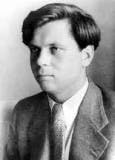Born in Klangiai, Veliuona parish. 1926-1930 - studied at Kaunas School of Art, 1931-1932 - lived in Paris. He worked for the left-wing magazine "Trečias frontas", with which he was involved in the LKP from the fifth issue, and then also for the pro-Communist magazine "Literatūra". In 1934 he was admitted to the Lithuanian Writers' Association. He published three novels ("Frank Kruk", "Zemė maitintoja", "Meisteris ir sūnūs"), two books of short stories ("Saulėlydis Nykos valsčiuje", "Kasdienės istorijos"), and children's books, which were very successful.
After the Soviet occupation in 1940, he wrote a number of books for children.
On 15 June 1940, after the occupation of Lithuania, he wrote articles glorifying the Red Army, the Soviet Union and Joseph Stalin.
In July, he joined the Lithuanian Communist Party and took part in the non-transparent elections to the People's Seimas, organised by the occupying Soviet regime. 14-15 July. On 14-14-14 July, he was elected deputy in the Alytus constituency, and on 21 July he was elected second secretary of the Presidium of the People's Seimas.
Along with four other members of the Presidium, Liudas Adomauskas, Mečius Gedvilas, Juozas Grigalavičius and Antanas Venclova, he signed four declarations of the People's Seimas, which abolished the constitutional order of the country in Lithuania: the private ownership of land ("The Declaration declaring the land to be the property of all the people", vol. The Declaration on the Nationalisation of Banks and Large Industry"), the state system ("Declaration on the State System") and the declaration of Lithuania's accession to the USSR ("Declaration on Lithuania's Accession to the Union of Soviet Socialist Republics"). These declarations were formal, as Lithuania's Sovietisation was not due to its occupation, but to the occupation of the USSR.
He was appointed a member of the twenty-person commission of commissioners which, at the Seventh Session of the Supreme Soviet in Moscow on 3 August 1940, requested Lithuania's admission into the USSR. This, too, only formally confirmed the Sovietisation of Lithuania.
The Central Committee of the Lithuanian Communist Party approved the statement of P. Cvirka of 16 August "On the Reorganisation of the Lithuanian Writers' [Society] on Soviet Grounds" and appointed him chairman of the Organising Committee of the Lithuanian Writers' Union.
During the Second World War he fled to Russia, lived in Almaty and Moscow, where he wrote, among other things, propaganda stories, and read them to the soldiers of the 16th Lithuanian Division. In August 1944, he returned to Lithuania.
From 29 October 1945, he was elected chairman of the board of the LSSR Writers' Union.
The powers of a member of the Presidium of the Supreme Soviet were not revoked until the elections of 1947, in which P. Cvirka was simultaneously a candidate for deputy and the chairman of the Central Electoral Commission.
In February 1947, he was elected a deputy of the LSSR Supreme Soviet in the constituency of Ukmergė. He died on 2 May 1947.
2017 Petras Cvirka Literary Prize, established in 1984 to recognize the best works of Lithuanian novelists, renamed the Veliuona Novella Prize.
2019. The Lithuanian Genocide and Resistance Research Centre concluded that "Petras Cvirka actively collaborated with the structures of the occupying Soviet power in his political and public activities, and his collaboration caused serious and harmful consequences for the fate of the Lithuanian state and its citizens. "
19 November 2021. On November 19, 1924, the monument to P. Cvirka, which had stood in Vilnius for 62 years, was removed. In 2022, the homestead-museum of Petras Cvirka's birthplace in Jurbarkas district was renamed the Klangiai ethnographic homestead.
